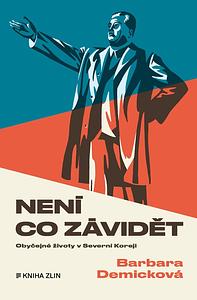You need to sign in or sign up before continuing.
Take a photo of a barcode or cover
I have been wanting to read this for quite a while. Glad I finally started! I was worried that I would be lost, knowing so little about North Korea. But Demick's writing is clear and interesting.
Oops. Finished reading this last week. Highly recommend.
Oops. Finished reading this last week. Highly recommend.
challenging
emotional
informative
medium-paced
This was an interesting look into the lives of the average North Korean of a decade and a half ago. The fear mongering of Western media and the violent escalation of North Korean threats against enemy nations and against its own people has made the country into something larger than life in the eyes of the general public. The people of North Korea having to just barely scrape by while their leader lives in luxury and hides the poverty of the average citizen even while seeking aid is horrifying. It's sad to see how little has changed in the last fifteen years.
This book is well written and the firsthand accounts of life in North Korea add weight to the input of what Demick has to add as a foreign journalist.
This book is well written and the firsthand accounts of life in North Korea add weight to the input of what Demick has to add as a foreign journalist.
Graphic: Child abuse, Child death, Confinement, Death, Domestic abuse, Slavery, Suicide, Violence, Xenophobia, Blood, Medical content, Trafficking, Kidnapping, Grief, Car accident, Death of parent, Gaslighting, Colonisation, Injury/Injury detail, Classism
Moderate: Animal death, Alcohol
Minor: Addiction, Gun violence, Sexual content, Abortion
A fascinating look at the lives of North Koreans who eventually left the country, at great risk to themselves and families. Absolutely absorbing, and astonishing.
Non-fiction account of life in North Korea: living through the 90s famine, the ongoing hardships, and the varying success of a handful of interviewees who escaped and set up life in South Korea. Not for the tender-hearted.
Such a thoughtfully historical, personal, and economic review of North Korea and the effect of the Kim family on the people at large. Overshadows previous books about North Korea that I've read. Even well-trod territory about the country found new life through her subjects' perspectives.
Such a fascinating read-- I want all my friends to read it so we can discuss! I'm still thinking about this book and life in North Korea a lot, maybe daily, since reading it two months ago. It focuses on the 90s and the great famine in North Korea, so the story is really sad and tough to read at times. I wish it told more recent news of what life is like now. The details are of the kind of life portrayed in a dystopian novel, but to the extent that you may find hard to believe. There were surely things I wouldn't have believed --except they are true and are a reality in North Korea today. So fascinating.
If you like your dystopia to be non-fiction, this is a book for you. I learned a lot, but it's been too long since I finished for me to write a proper review. I mainly remember that having finished this about the same time as two or three other gloomy books, I had to take a serious junk break afterwards.
The author, Barbara Demick, is a journalist. When she was stationed in South Korea, she began to interview North Koreans who had escaped their country and found a way to begin a new life. This book covers six individuals, who recount their lives under Kim Il-sung and his son Kim Jong-il (the father of the current leader Kim Jong-un). In this very readable account of the most oppressive regimes, you understand the country's recent history and the struggles endured by the survivors who live there. Limited resources, food, water, electricity, news from the outside world, make every day a struggle. And all the while, their government pours all its resources into the military to fund the arms race. An immensely interesting and valuable read.
Very interesting and thorough look at life in North Korea from the 1950s through the late 90s as told through the stories of 6 people who defected to South Korea. The description of children starving to death (one kindergarten class went from 50 to 15 students in just a couple of years) is terrible, and seems likely to have continued to this day. Starvation and poverty is one aspect, and brainwashing and spying by your neighbors is another that would make life there unbearable. No one can speak their real thoughts out loud to anyone because of the very real fear it would endanger the lives of their entire family.
The title of the book comes from a song which says that the North Koreans have nothing to envy in the rest of the world. This has not been true since at least the mid 90s, when the government stopped distributing food to everyone as it used to do, but still required people to go to work without being paid, and also forbid them from selling food in a market (capitalism). So many people were dying from starvation that the train station took a cart through daily to collect the bodies.
The title of the book comes from a song which says that the North Koreans have nothing to envy in the rest of the world. This has not been true since at least the mid 90s, when the government stopped distributing food to everyone as it used to do, but still required people to go to work without being paid, and also forbid them from selling food in a market (capitalism). So many people were dying from starvation that the train station took a cart through daily to collect the bodies.
dark
sad
tense
medium-paced





